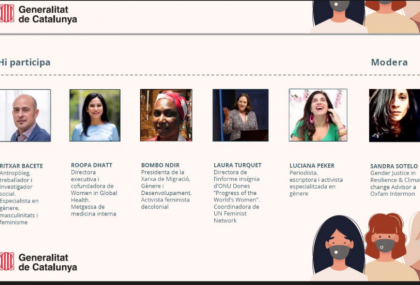
The COVID-19 crisis is exposing pre-existing inequalities across every sphere, from health to the economy, to social protection. These are particularly exacerbated among women and girls. According to UN Women, in the 12 months prior to the pandemic, 243 million girls and women worldwide between the ages of 15 and 49 had experienced physical and sexual violence at the hands of their partners. During the pandemic, gender-based violence has dramatically increased. Many are victims of domestic and intimate partner violence, and lockdowns implemented to curb the spread of the virus have trapped them in their homes with their abusers. It has also become clear that the lack of gender balance in governance and decision-making spaces where responses are formed, can have harmful consequences in the design of responses and decision-making processes, because analyses and considerations related to gender, age, etc., which are decisive in ensuring a rights-based approach, are often overlooked.
Webinar: COVID-19 & Gender
On March 9th, 110 participants from twelve countries from all over the world attended the webinar on “COVID-19 & Gender: lessons learned and building back better”.
Generalitat de Catalunya organized this debate in order to emphasize the crucial importance of the SDG 5 of the 2030 Agenda for Sustainable Development, which is to "achieve gender equality and empower all women and girls" and exchange views on the impact of COVID-19 on women’s rights; women’s role in the governance and response to the pandemic; how to strengthen a gender-focused development cooperation; the role of new masculinities; and lessons learned.
Invited as panelist were:
• Roopa Dhatt, EEUU. Executive director and cofounder of Women in Global Health.
• Laura Turquet, UK. Policy Advisor at UN Women. Leads the ‘Progress of the World’s Women’ report. Cofounder of the UN Feminist Network.
• Luciana Peker, Argentina. Journalist, writer and activist specialized in gender.
• Ritxar Bacete, Basque Country. Anthropologist and social worker and researcher. Specialist in gender, masculinities and feminism.
• Bombo Ndir, Senegal/Espanya. President of the Migration, Gender and Development Network. De-colonial feminist & activist.
During the webinar, ideas were shared and recommendations were made:
- Public and cooperation budgets are necessary for women’s voices to be relevant.
- Though men have a higher mortality rate in all age groups, women and girls have suffered the worst secondary impacts. Women are the social shock absorbers.
- Home is not necessarily a safe place for women. Women have died because decision-makers got this wrong.
- Migrant women are the invisible among the invisible.
- Crisis are never gender-neutral.
- It is important to emphasize the link between women’s economic autonomy and the issue of violence against women.
- International development cooperation shall be aligned with feminist movements.
- Encourage international development cooperation that can foster change for women.
Coming up
This was the first one of a series of webinars on ‘COVID-19 and cooperation’. With these round tables, the Catalan Government aims to generate a space for cooperation actors to analyze and reflect on how COVID-19 is forcing us to reshape the work we do in order to strengthen public policies to better meet global challenges with courage and commitment.
Next sessions will be as follows:
- COVID-19 & Migration – Tuesday 13th April
- COVID-19 Civil & Political Rights & governance – Tuesday 11th May
- COVID-19 & Climate & transformative economies – Tuesday 8th June
- COVID-19 & the future of Development Cooperation – Tuesday 13th July
